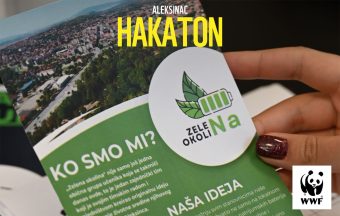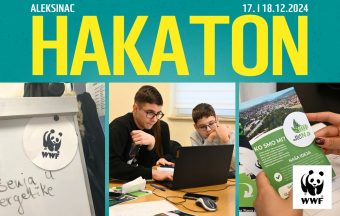Climate change in Serbia is no longer an abstract threat – it is a reality. Droughts, extreme weather events, and shifts in seasonality are leaving a profound impact not only on agriculture but also on plant and animal life, warns Aleksandra Ugarković from the World Wide Fund for Nature (WWF).

Aquatic ecosystems are drying up, forest communities are changing, and migratory species are losing their safe havens. To break this vicious cycle of habitat loss and climate impacts, WWF in Serbia is combining nature conservation with a just transition to renewable energy sources. Through projects in local communities, such as Obrenovac and Aleksinac, young people are developing green ideas that do not harm nature. The organization also works with municipalities and decision-makers to ensure that the energy transition is inclusive and sustainable.
– Our goal is to unite nature conservation with a just transition to renewable energy. Over the past four years, we have done this through projects that encourage the development of green ideas and activism among high school students in Obrenovac and Aleksinac. The idea is for young people to think in terms of businesses that do not threaten habitats and species, as opposed to past models that have unsustainably exploited nature and its resources. We also work with communities, municipalities, and decision-makers to make this transition inclusive and sustainable, said Ugarković.
Another example of concrete action in Serbia is the planting of native tree species in Gornje Podunavlje – by restoring black and white poplar, oak, and willow, WWF is reviving wetland ecosystems, increasing resilience to floods, and capturing CO2 from the atmosphere.
– We launched tree planting in Gornje Podunavlje, the Serbian part of the European Amazon, because it is one of the last major wetland areas in Europe with immense importance for nature conservation, but which has been exposed to degradation for decades. Restoring trees such as black and white poplar, oak, and willow means restoring natural balance, strengthening resilience against floods, and capturing CO2 from the atmosphere. These species are native and adapted to the specific conditions of the Danube forests. They are not only a symbol of nature’s return but also our allies in the fight against climate change in the Amazon of Serbia, Ugarković emphasized.
IN FOCUS:
- How ABB Technology Redefines Industrial Energy Efficiency
- The July Wildfire Wave In Serbia – An Alarm We Must Not Ignore
- The Primeval Forests of the Federation of BiH Among the Few in Europe
Floating Station in Vienna Safeguards the Future of Sturgeons

Hardly any animal species on the planet is closer to extinction than sturgeons – ancient river giants that have survived for over 200 million years. Today, they are among the most endangered species in the world. In an effort to halt their disappearance, the first European floating station for sturgeon breeding was recently opened in Vienna.
On the MS Negrelli, a 66-meter-long vessel currently moored at the Danube Island, a breeding stock and genetic bank of the remaining native Danube species will be established. The goal of the project is to breed and return about 1.6 million young individuals of four surviving sturgeon species to the wild by 2030.
Ugarković adds that through activities such as the European floating station for breeding young sturgeons, WWF contributes to their return to the Danube. There are similar initiatives in Serbia as well, but she stresses that broader international cooperation is essential.
Earth Hour: More than Turning Off the Lights, a Beginning of Change
The global campaign Earth Hour once again brought together more than 20 cities and municipalities from Serbia this year. The message was clear: let us use our moment for the planet – through small but meaningful actions.
– Earth Hour is much more than turning off the lights – it is a moment when we remember that we are all connected. This year’s message was simple: to use our moment for the planet. Whether it is planting a tree, talking about climate with friends, or switching off the lights, everyone can contribute. From Serbia and the region, more than 20 cities and municipalities joined this year, and support also came from institutions, schools, media, and individuals. This shows that awareness is growing, said our interviewee.
In the coming period, WWF will continue with projects for the conservation of rivers, forests, and species, with a strong focus on the energy transition. The goal of having 70 percent of energy come from renewable sources by 2040 is ambitious but achievable – if, as WWF says, we work together and start with ourselves.
Prepared by Milena Maglovski
The story was published in Energy portal Magazine CLIMATE CHANGE

